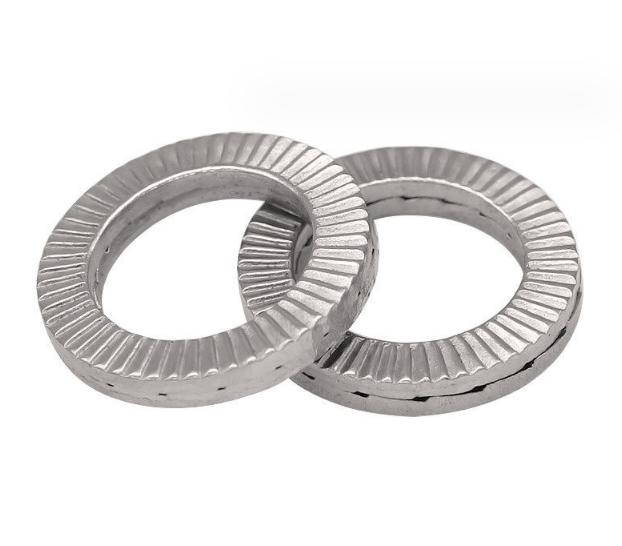What are Different Types of Washes for Bolts and How to Choose the Right One
Washers might seem like small, insignificant components in the world of fasteners, but they play a crucial role in ensuring the stability, integrity, and longevity of bolted connections. These unassuming disks, available in various shapes and sizes, serve as essential intermediary components between bolts or nuts and the surfaces they secure. In this comprehensive guide, we will explore the different types of washers for bolts, the vital functions they perform in the realm of mechanical connections and how to choose the right types of washers for bolts.

4 Main Different Types of Washers for Bolts
1. Flat Washers
Flat washers are perhaps the most common type of washer, and they come in various shapes and sizes. Their primary function is to distribute the load of the bolt or nut over a larger surface area, effectively preventing surface damage caused by localized pressure points. They also reduce friction and heat generated during the tightening process. Flat washers can be used with any type of bolt or nut, making them highly versatile in various applications.
2. Lock Washers
Lock washers are specifically designed to prevent the bolt or nut from loosening due to vibration or torque. These washers are available in several different configurations, each catering to specific needs. Examples of lock washers include split lock washers, wave washers, and tooth lock washers. The choice of lock washer depends on the application and the level of security required to prevent loosening.
3. Spring Washers
Spring washers are characterized by their ability to provide a constant spring force between the nut or bolt and the surface it fastens to. This constant force helps prevent the bolt or nut from loosening due to vibration or torque, offering enhanced reliability in critical applications. Spring washers are often used in conjunction with other washer types, such as lock washers, to provide a multifaceted approach to security.
4. Specialized Washers
Specialized washers are tailored for specific applications, where standard washers might not suffice. These specialized variants cater to unique needs and challenges, ensuring a secure and efficient connection. Some examples include:
- Fender washers: These are used to distribute the load of a bolt or nut over a large surface area, making them ideal for sheet metal panels and similar applications.
- Countersunk washers: Designed to recess the head of a bolt or nut flush with the surface it fastens to, providing a sleek and smooth appearance.
- Sealing washers: Employed to create a watertight seal, particularly useful in applications where leaks are a concern, such as pipe connections.

Function of Washers
Washers perform several critical functions in bolted connections:
- Distribute the Load: One of the primary functions of washers is to evenly distribute the load imposed by the bolt or nut over a larger surface area. This prevents the surface from getting damaged due to localized pressure points, ensuring the longevity of the connection.
- Reduce Friction and Heat: Washers act as a buffer between the fastener and the surface, reducing friction and heat generated during the tightening process. This is especially important in applications where excessive friction and heat can compromise the connection’s integrity.
- Prevent Loosening: Lock washers and spring washers are specifically designed to prevent the bolt or nut from loosening over time due to vibrations or torque. These washers provide an additional layer of security, ensuring that the connection remains stable.
- Provide a Smooth Surface: Washers offer a smooth surface for the nut or bolt to bear against, ensuring that the fastener can be tightened evenly and securely.
- Seal Against Leaks: Certain specialized washers, such as sealing washers, are used to create a watertight seal, preventing leaks in applications where fluid containment is crucial.
Tips for Choosing the Right Types of Washers for Bolts
Selecting the appropriate washer for a specific application is crucial to ensure the reliability and longevity of a bolted connection. When making this choice, consider the following factors:
- Types of Bolts or Nuts: Different fasteners may require specific washer types to function optimally. Consider the design and requirements of the bolt or nut being used.
- Application: The intended application of the fastener plays a significant role in determining the type of washer needed. For instance, a washer used in a structural application might differ from one used in an automotive application.
- Material of the Surface: The material of the surface being fastened to can impact the washer’s choice. For example, when dealing with corrosive environments, selecting a corrosion-resistant washer material is essential.
- Preventing Loosening: If the primary concern is preventing loosening due to vibrations or torque, consider using lock washers or spring washers in addition to standard flat washers.
- Sealing Requirements: In applications where sealing against leaks is critical, opt for specialized sealing washers designed for that purpose.

Conclusion
Washers are an often-overlooked but indispensable component of bolted connections. They play a pivotal role in distributing loads, reducing friction and heat, preventing loosening, and providing a smooth surface for fasteners. Additionally, specialized washers cater to unique requirements, ensuring that bolted connections remain secure and dependable. When selecting a washer, consider factors such as the type of fastener, the application, and the material being fastened. By making informed choices, you can enhance the reliability and longevity of your bolted connections, ensuring they withstand the test of time and usage.









